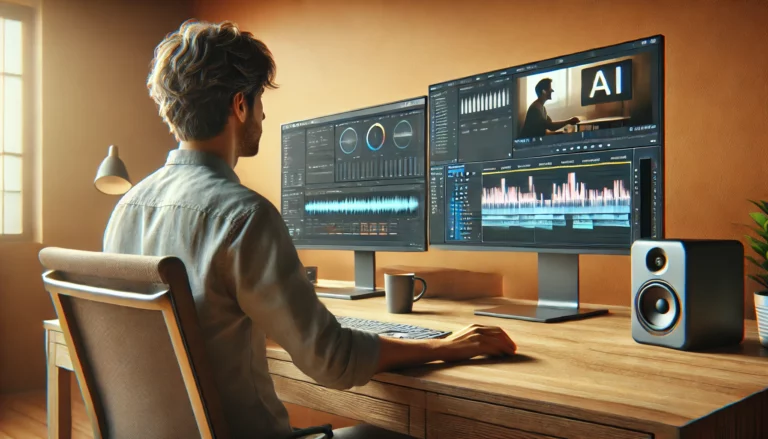Voice acting is all the rage these days, and it’s no surprise, really! It’s one of the top professions you can do from home and can make you into a top earner in a relatively short time. But, even if it seems easy to “do voices,” it takes plenty of work. That’s why today I’m going to let you in on how to get into voice acting quickly, easily, and painlessly. This doesn’t mean that it won’t take effort, though, so bear with me and enjoy the ride!
And yes, “voice acting” really is a fulfilling career. Maybe you didn’t get the memo, and that’s OK too; plenty of people are just now discovering the remote work revolution. COVID-19 (isn’t that so, like, two years ago?) has, if anything, accelerated our adoption of new methods of work. And I can assure you that, if you’re diligent, this is a lifestyle that can absolutely work for you. With a little skill, commitment, and effort, it’s absolutely within your reach.
But, first, we’ll have to lay the groundwork, and go over the basics together:
- What is voice acting?
- Why is it so profitable? What will you get out of it?
- What makes a good voice actor and how do you become one?
- Where does one get work?
If we take it slow, then what seems like an insurmountable obstacle will seem more and more doable. Ready to enter a whole new world? Let’s get started!
How to Get Into Voice Acting — What Are We Doing, Now?
Here, there’s no shame in taking it from the top, right? Voice acting is one of those ubiquitous things that we’ve always taken for granted. But our lives would be pretty dull—not to mention silent—without it.
In “What is Voice Acting? An Easy Guide,” I wrote the following words about the topic:
Voice acting refers to the practice (or rather, art) of doing voice-overs. In the cases we’ve referred to above, they’re usually character performances. They can also be used for business or education, to provide information to the audience or users. Think about an explainer video as an example of this last one.
It can be seen as the practical arm of what’s known as voice-overs, or audio narration.
Some common examples of voice-over usage you may have seen include characters in animated features and video games, cartoons, films, dubbed versions of films in a foreign language, TV shows, radio and audio dramas, commercials, etc.!
As you can tell, voice acting is all over the place. Wherever you hear a recorded voice in any medium, chances you’re hearing the job of a voice actor or actress plying their trade. If you pay attention, you’ll realize the enormous scope of the industry!
An Abundance of Opportunities
So, as you can see, while voice acting is mostly about character work, it can also apply to the larger profession of voice-overs. That means that you don’t have to be the next Mark Hamill or Mel Blanc in order to try to land a few gigs and break into this profession. (Doesn’t mean that you won’t have to be really good at what you do, though.)
And, what’s more, when you learn how to get into voice acting, you’re opening yourself up to a potential high-income career. And profit is not even half of it; there’s also freedom, independence, and the possibility to work remotely from wherever you want. But more on that in a bit.
Freelance Voice Actor Salary and Lifestyle
Makes it sound like some kind of magazine, right? But, yeah, while this is not exactly “Lifestyle of the Rich and Famous,” it ain’t exactly a regular 9-5 gig either. And while learning how to get into voice acting can also lead you to some stable jobs, variety is usually the name of the game here. Well, variety, money, and independence.
For instance, ZipRecruiter estimates an incredibly variable $15 to $200k for voice actors. Those on the high end probably landed steady jobs for companies or studios, while others are most likely part-timing. What we want are averages, and that’s really where this profession shines above many others.
“As of May 26, 2021, the average annual pay for a Voice Actor in the United States is $76,297 a year.
Just in case you need a simple salary calculator, that works out to be approximately $36.68 an hour. This is the equivalent of $1,467/week or $6,358/month.
While ZipRecruiter is seeing annual salaries as high as $217,000 and as low as $13,500, the majority of Voice Actor salaries currently range between $23,000 (25th percentile) to $111,500 (75th percentile) with top earners (90th percentile) making $199,000 annually across the United States. The average pay range for a Voice Actor varies greatly (by as much as $88,500), which suggests there may be many opportunities for advancement and increased pay based on skill level, location and years of experience.”
Others, like Salary.com, estimate lower wages, around the $40,000 average. Still, they take into account mostly regular voice-overs, like PA announcements, audiobooks, etc, and not character work, which is one of the highest-paid niches.
Other salary aggregators like GlassDoor point towards a base pay of $25 an hour. That’s one of the highest non-qualified starting wages in any industry.

Living Large
But, pay is not everything, of course. We also have to take into account other factors like freedom. Not going to the office every day can be a draw for many people, as well as working from anywhere. Conceivably, a qualified voice actor just needs these things:
- Their voice
- A good microphone
- An insulated room, or a portable recording shield
- Audio editing software
- A stable internet connection
So, while many prefer to work from a home studio, others prefer the thrill of life on the go. Learning how to get into voice acting can be a golden ticket to a lifestyle on your terms. Whether it’s work-from-home, or “home is where the heart is,” you’ve got plenty of options. Changing scenery often is not for everyone, but for those who do, the right equipment already exists to facilitate professional results from anywhere.
How to Get Into Voice Acting
To learn how to get into voice acting, you first have to assess your instrument and skills. Not everybody has a chameleon-like voice where they can step into any niche overnight. But, maybe you have the perfect announcer voice, or you’re just great at a particular style. It’s not a patch on anyone if they’re good at one thing, and one thing alone.
But, before you try to step into the limelight, you should assess your skills carefully. Of course, you’ll need the right equipment (microphone, software, and a good shield or insulated room), which should go without saying. It’s only then that you’ll be able to actually start your voice-over practice. Still, you’ll have to practice the key pillars:
- Learning about resonators
- Breathing
- Correct mic usage
- Practicing sample scripts
- Editing your voice-over clips
Practice makes perfect, as they say. And it’s also the best way to really get a handle on what your strengths and weaknesses are. Another question that comes up regularly is about the need for voice-over lessons. Are they really necessary, or just fluff?
Lessons and Samples
Lessons can benefit many and are certainly not superfluous. But, depending on your chosen voice-acting niche, you can get by with just natural talent and good control of your voice. But, lessons will most benefit you in those high-endurance, marathon sessions for characters, for instance. Learning good technique is never not good, but it’ll all depend on your starting level of talent, control, and ability.
Still, I would advise not trying to get any clients before you can get your samples independently vetoed. And samples are what you’ll need to land ANY gig. What does this mean, essentially? That you’ll need to produce great-quality samples even before you get to work officially. These could be part of your lessons, or they could be part of the learning curve of natural practice. But, in the end, you’ll need to have something to show your potential employer that you have the right voice for the job.
This, of course, is easier if you have a voice coach vetting your work. If not, you’ll have to rely on friends and knowledgeable acquaintances. That’s why it pays to know what you’re doing!
How to Get Into Voice Acting — Where?
Then, there’s the matter of where to get paid work after you took the plunge and learned how to get into voice acting. Other freelancing pages often cause issues for freelancers, especially newcomers, but Bunny Studio is exceptional in that regard. We make it extremely easy for our freelancers to start getting gigs on our platform. The process is super simple!
- You create your user.
- Then, you send us your best samples, as well as your areas of expertise, or areas where you’d like to develop further.
- After, we’ll take a look at your profile, and direct you to record a sample project for us. That’ll help us understand whether you can work on a deadline and if you can deliver the goods on time.
- If you do, presto! You’re in, and we’ll feature you on our site.
- Now you can start landing gigs, and making good money through voice acting!
The process couldn’t be any simpler, and our vetoing takes all of the guesswork out of the equation. If we feel your material could use a little work, we won’t be shy about telling you. Still, we believe that everyone deserves a shot at success, and we only care about your ability to deliver high-quality voice acting. If you’ve got the goods, it doesn’t matter if you’re Berklee-trained or a talented up-and-comer.
Want to start your career? Hit us up and become a Bunny Studio Pro Today!









